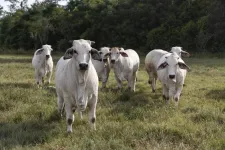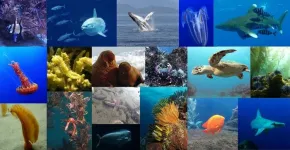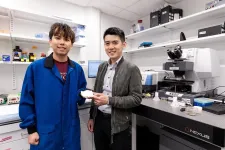(Press-News.org)
New Haven, Conn. — The capacity to adjust beliefs about one’s actions and their consequences in a constantly changing environment is a defining characteristic of advanced cognition. Disruptions to this ability, however, can negatively affect cognition and behavior, leading to such states of mind as paranoia, or the belief that others intend to harm us.
In a new study, Yale scientists uncover how one specific region of the brain might causally provoke these feelings of paranoia.
Their novel approach — which involved aligning data collected from monkeys with human data — also offers a new cross-species framework through which scientists might better understand human cognition through the study of other species.
Their findings, and the approach they used, are described June 13 in the journal Cell Reports.
While past studies have implicated some brain regions in paranoia, the understanding of paranoia’s neural underpinnings remains limited.
For the new study, the Yale researchers analyzed existing data from previous studies, conducted by multiple labs, on both humans and monkeys.
In all of the previous studies, humans and monkeys performed the same task, which captures how volatile, or how unstable, a participant believes their environment to be. Participants in each study were given three options on a screen, which were associated with different probabilities of receiving a reward.
If the participants selected the option with the highest probability of reward, they would get a reward with fewer clicks across trials. The option with the lowest probability required more clicks to receive a reward. The third option, meanwhile, was somewhere in the middle. Participants did not have information on the reward probability and had to uncover their best option by trial and error.
After a set number of trials and without warning, the highest and lowest reward probability options flip.
“So participants have to figure out what’s the best target, and when there’s a perceived change in the environment, the participant then has to find the new best target,” said Steve Chang, associate professor of psychology and of neuroscience in Yale’s Faculty of Arts and Sciences and co-senior author of the study.
Participants’ clicking behavior before and after the flip could reveal information about how volatile they view their environment to be and how adaptive their behavior is within that changing environment. “Not only did we use data in which monkeys and humans performed the same task, we also applied the same computational analysis to both datasets,” said Philip Corlett, an associate professor of psychiatry at Yale School of Medicine and co-senior author of the study. “The computational model is essentially a series of equations that we can use to try to explain the behavior, and here it serves as the common language between the human and monkey data and allows us to compare the two and see how the monkey data relates to the human data.”
In the previous studies, some of the monkeys had small but specific lesions in one of two brain regions of interest: the orbitofrontal cortex, which has been associated with reward-related decision-making, or the mediodorsal thalamus, which sends environmental information to the decision-making control centers of the brain. Among human participants, some had reported high paranoia and some did not.
The researchers found that the presence of lesions in both brain regions negatively affected the behavior of the monkeys, but in different ways.
Monkeys with lesions in the orbitofrontal cortex more often stuck with the same options even after not receiving a reward. Those with lesions in the mediodorsal thalamus, on the other hand, displayed erratic switching behavior, even after receiving reward. They appeared to perceive their environments as especially volatile, which was similar to what the researchers observed in the human participants with high paranoia.
The findings offer new information about what is happening in the human brain — and the role the mediodorsal thalamus might play — when people experience paranoia, say the researchers. And they provide a pathway for how to study complex human behaviors in simpler animals.
“It allows us to ask how we can translate what we learn in simpler species — like rats, mice, maybe even invertebrates — to understand human cognition,” said Corlett, who, along with Chang, is a member of Yale’s Wu Tsai Institute, which aims to accelerate understanding of human cognition.
This approach will also allow researchers to assess how pharmaceutical treatments that affect states like paranoia actually work in the brain.
“And maybe down the road we can use it to find new ways to reduce paranoia in humans,” said Chang.
The work was led by co-first authors Praveen Suthaharan, a graduate student in Corlett’s lab, and Summer Thompson, an associate research scientist in Yale’s Department of Psychiatry. It was done in collaboration with Jane Taylor, the Charles B.G. Murphy Professor of Psychiatry at Yale School of Medicine.
END
Popular web browser extensions designed to protect user privacy and block online ads are falling short, according to NYU Tandon School of Engineering researchers, who are proposing new measurement methodologies to better uncover and quantify these shortcomings.
Led by Rachel Greenstadt, professor in the NYU Tandon Computer Science and Engineering (CSE) Department, the team will present its study at the 19th ACM ASIA Conference on Computer and Communications Security, taking place July 1–5, 2024 in Singapore.
Through ...
Sweaty cows may not sound like the most exciting company, but in a warming world, researchers can’t get enough of them.
When cattle are too hot, they tend to stop eating, said Raluca Mateescu, University of Florida Institute of Food and Agricultural Sciences (UF/IFAS) professor in the department of animal science. This affects the cattle’s health and growth and threatens the longevity of the food supply coming from that herd.
Climate change is making it more difficult to raise cattle – growth and reproduction are affected by heat – so ...
Virginia Tech’s Audrey Ruple and Courtney Sexton, already deeply involved in data collection and analysis for dog health and connections to humans through the Dog Aging Project, are imploring fellow scientists to cast the net even wider for data on the shared environments of humans and dogs in a perspective piece that appears this month in the journal Science.
“Human environments and the impacts of environmental factors can vary substantially, and this variation should be captured by future studies of dogs to more accurately assess exposure risks for different and vulnerable populations,” ...
The Office of the Vice President for Research and Innovation at The University of Texas at Arlington has granted 10 Research Enhancement Program (REP) awards valued at more than $130,000 to support new research initiatives.
The REP grant serves as seed funding for launching new research, providing a foundation for recipients to pursue future research and funding from external sources.
“UTA is committed to fostering a culture of innovation and research discoveries for our community of scholars,” said Kate C. Miller, vice ...
LOS ANGELES, CA
The Protein Society is proud to announce that the winners of the 2023 Protein Science Best Paper awards are Evan T. Liechty from the University of Colorado, USA, and Sophie Rizzo, from Lehigh University, USA.
Evan T. Liechty
Protein Science 2023 August;32(8):e4719.doi:10.1002/pro.4719
Analysis of neutral mutational drift in an allosteric enzyme
Evan T. Liechty1, Andrew Hren1, Levi Kramer1, Gregory Donovan1, Anika J. Friedman1, Michael R. Shirts1, Jerome M. Fox1
1Department of Chemical and ...
(Santa Barbara, Calif.) — The countries of the world agreed: Our planet needs more protection from human activity. And with the globe facing an assortment of environmental crises, they realized the plan needed to be ambitious. Thirty-by-thirty was their proposal: protect 30% of the planet by 2030. But while conservation is popular in principle, the costs of actually enacting it often stall even the most earnest efforts.
Three researchers at UC Santa Barbara have proposed a market-based approach to achieving the 30x30 targets in the ocean. They tested whether a system that allowed countries to trade conservation ...
This year has already seen massive heatwaves around the globe, with cities in Mexico, India, Pakistan and Oman hitting temperatures near or past 50 degrees Celsius (122 degrees Fahrenheit).
As global temperatures and urban populations rise, the world’s cities have become “urban heat islands,” with tight-packed conditions and thermal radiation emitting from pavement and skyscraper trapping and magnifying these temperatures. With 68 percent of all people predicted to live in cities by 2050, this is a growing, ...
Oregon State University researchers found that U.S. adults are fairly confident in linking wildfires and heat to climate change, but less confident when it comes to other extreme weather events like hurricanes, flooding or tornadoes.
The recent study found that politics and personal experience played significant roles in people’s responses: Self-identified Republicans were less likely than Democrats to attribute extreme weather events to climate change, though Republicans who had personally experienced negative impacts from extreme weather events were more likely to link them to climate change than those who hadn’t.
Looking at ...
The increase in the frequency and intensity of marine heatwaves in recent decades is one of the effects of global climate change. A study by the University of Barcelona, published in the Journal of Animal Ecology, shows that the extreme heatwave of 2022 caused an “unprecedented” increase in mortality of the red gorgonian Paramuricea clavata, affecting 70% of the colonies located in the Montgrí Natural Park, the Medes Islands and the Baix Ter. According to the researchers, these results are “alarming ...
An analysis of reviews of translational biomedical research reveals that just 5% of therapies tested in animals reach regulatory approval for human use. The study, an umbrella review, published June 13th in the open access journal PLOS Biology, summarizes other systematic reviews and provides high level evidence that while the rate of translation to human studies is 50%, there is steep drop off before final approval. The authors argue that improved robustness and generalizability of experimental approaches could help increase the chances of translation and final approval.
Animal studies are used in basic research ...




